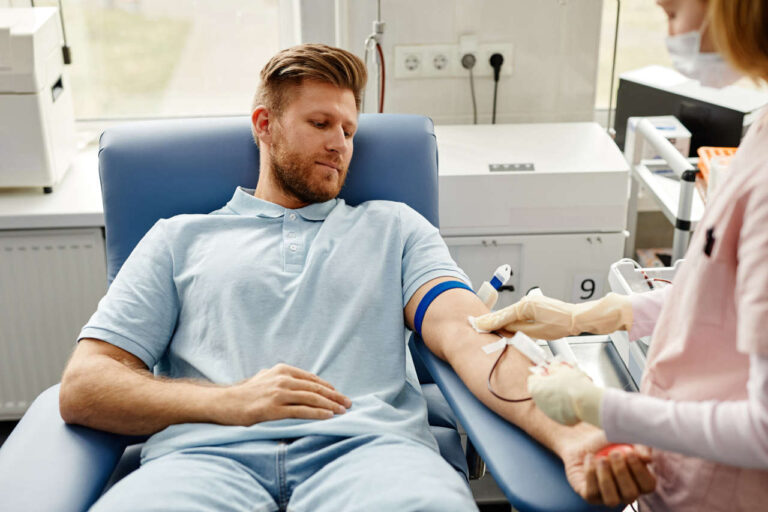
High-dose IVIG for rheumatoid arthritis (RA) is promising, but its use is still considered investigational.
Consult an IVIG Specialist
The Best IVIG Home Infusion | Get IVIG Treatment AssistanceIt is well established that IVIG regulates your immune response. Moreover, serious toxicity is infrequent with IVIG therapy. Both these factors make it an attractive alternative to corticosteroids or other medications used to treat rheumatoid arthritis.
IVIG therapy has been shown to be effective in several diseases, including [1]:
- Kawasaki disease
- Chronic inflammatory demyelinating polyneuropathy (CIDP)
- Guillain–Barré syndrome (GBS)
- Autoimmune hemolytic anemia
Individuals with immunoglobulin deficiencies may be at risk for developing rheumatoid arthritis, and IVIG appears to be a potential treatment for rheumatoid arthritis [2].
But does it really work? This article explores the evidence, potential mechanism of action, and the limitations of use.
A Quick Overview of the Prevalence and Treatment Options for Rheumatoid Arthritis
Rheumatoid arthritis is an autoimmune disorder that affects your joints. It occurs when your immune system attacks the tissues of your joints. This leads to joint pain, swelling, and stiffness. Approximately 1.3 million U.S. adults live with this condition [3].
Medical treatments include:
- Nonsteroidal anti-inflammatory drugs (NSAIDs) to relieve pain and reduce inflammation
- Corticosteroids to reduce inflammation and pain and slow joint damage
- Conventional disease-modifying antirheumatic drugs (DMARDs). Examples include methotrexate (Trexall), leflunomide (Arava), and hydroxychloroquine (Plaquenil).
- Biologic agents, such as etanercept (Enbrel), infliximab (Inflectra), and rituximab (Rituxan)
- Targeted synthetic DMARDs, such as baricitinib (Olumiant), tofacitinib (Xeljanz), and upadacitinib (Rinvoq)
Lastly, surgery may be considered if medications don’t resolve symptoms.
IVIG for Rheumatoid Arthritis: A Closer Look at the Evidence
Overall, there is conflicting evidence on the benefits of IVIG for RA.
A 1994 trial in children with active RA failed to show any significant benefit of IVIG over placebo [4].
However, in a 1995 study, researchers administered 400 mg/kg of IVIG to 10 participants with active, treatment-resistant RA for the first 3 days, followed by monthly doses for 12 months. After monthly clinical and laboratory evaluations, they concluded that IVIG can improve symptoms and functional capability [5].
A separate 1996 trial found no evidence of the efficacy of IVIG in RA [6].
Authors of a 2015 review concluded that IVIG might be an option if you cannot take corticosteroids or other RA medications [7].
In a 2021 investigation, researchers observed the potent anti-inflammatory action of IVIG in mice, suggesting the potential role of IVIG for rheumatoid arthritis in humans [8].
Potential Mechanism of IVIG for Rheumatoid Arthritis
In 2023, German researchers published a paper suggesting the potential IVIG mechanism of action in RA. According to the article, IVIG suppresses the degeneration of bones and cartilage in joints at a molecular level [9].
Speak to a Specialist About Copay Assistance
The Limitations of IVIG for Rheumatoid Arthritis
The first limitation is that IVIG is not FDA-approved to treat RA. In addition, many professional organizations recommend against using IVIG for rheumatoid arthritis.
For instance, the “Criteria for the clinical use of intravenous immunoglobulin in Australia” does not support the use of IVIG for rheumatoid arthritis and recommends alternative treatments [10].
Moreover, researchers have yet to discover the exact mechanism of action, optimal dosage, and long-term effects.
Key Takeaways
- IVIG is an investigational treatment option for RA.
- Many treatment options with proven efficacy are available, such as corticosteroids and DMARDs.
- There is no evidence to support the use of IVIG for rheumatoid arthritis. However, it may be considered an option if conventional treatments fail.
- Large controlled trials are needed to establish the benefits of IVIG in people with RA.
REFERENCES:
- Mulhearn, Ben, and Ian N Bruce. “Indications for IVIG in rheumatic diseases.” Rheumatology (Oxford, England) vol. 54,3 (2015): 383-91. doi:10.1093/rheumatology/keu429
- Kaestner, S., Wolff, HJ., Braeuer, R. et al. Immunoglobulin deficiencies in treated patients suffering from rheumatoid arthritis. Rheumatol Int 41, 1273–1280 (2021). https://doi.org/10.1007/s00296-021-04871-x
- Xu, Yingke, and Qing Wu. “Prevalence Trend and Disparities in Rheumatoid Arthritis among US Adults, 2005-2018.” Journal of clinical medicine vol. 10,15 3289. 26 Jul. 2021, doi:10.3390/jcm10153289
- Silverman, E D et al. “Intravenous immunoglobulin in the treatment of systemic juvenile rheumatoid arthritis: a randomized placebo controlled trial. Pediatric Rheumatology Collaborative Study Group.” The Journal of rheumatology vol. 21,12 (1994): 2353-8.
- Muscat, C et al. “Long term treatment of rheumatoid arthritis with high doses of intravenous immunoglobulins: effects on disease activity and serum cytokines.” Annals of the rheumatic diseases vol. 54,5 (1995): 382-5. doi:10.1136/ard.54.5.382
- Maksymowych, W P et al. “High dose intravenous immunoglobulin (IVIg) in severe refractory rheumatoid arthritis: no evidence for efficacy.” Clinical and experimental rheumatology vol. 14,6 (1996): 657-60.
- Katz-Agranov, Nurit et al. “The role of intravenous immunoglobulins in the treatment of rheumatoid arthritis.” Autoimmunity reviews vol. 14,8 (2015): 651-8. doi:10.1016/j.autrev.2015.04.003
- Halpert, G et al. “IVIG ameliorate inflammation in collagen-induced arthritis: projection for IVIG therapy in rheumatoid arthritis.” Clinical and experimental immunology vol. 203,3 (2021): 400-408. doi:10.1111/cei.13532
- Seeling, Michaela et al. “Immunoglobulin G-dependent inhibition of inflammatory bone remodeling requires pattern recognition receptor Dectin-1.” Immunity vol. 56,5 (2023): 1046-1063.e7. doi:10.1016/j.immuni.2023.02.019
- National Blood Authority. Criteria for the Clinical Use of Intravenous Immunoglobulin in Australia – Second Edition. blood.gov.au/pubs/ivig/conditions-for-which-IVIg-use-is-not-supported.html#cdn-32.













